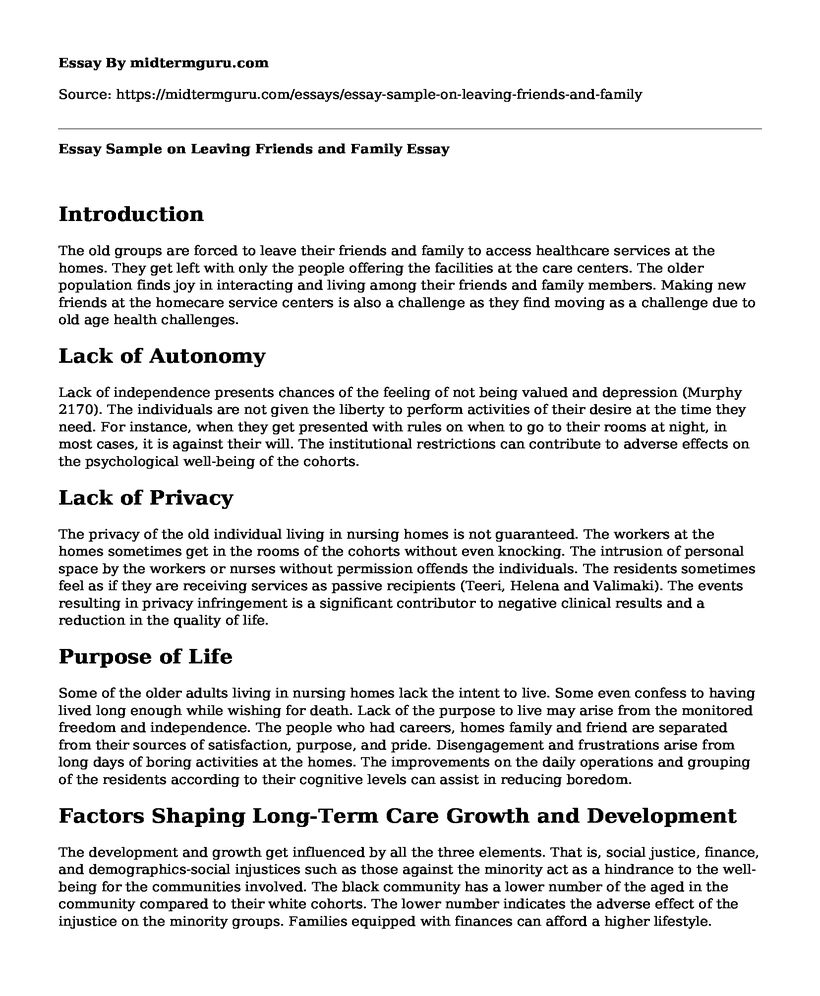Introduction
The old groups are forced to leave their friends and family to access healthcare services at the homes. They get left with only the people offering the facilities at the care centers. The older population finds joy in interacting and living among their friends and family members. Making new friends at the homecare service centers is also a challenge as they find moving as a challenge due to old age health challenges.
Lack of Autonomy
Lack of independence presents chances of the feeling of not being valued and depression (Murphy 2170). The individuals are not given the liberty to perform activities of their desire at the time they need. For instance, when they get presented with rules on when to go to their rooms at night, in most cases, it is against their will. The institutional restrictions can contribute to adverse effects on the psychological well-being of the cohorts.
Lack of Privacy
The privacy of the old individual living in nursing homes is not guaranteed. The workers at the homes sometimes get in the rooms of the cohorts without even knocking. The intrusion of personal space by the workers or nurses without permission offends the individuals. The residents sometimes feel as if they are receiving services as passive recipients (Teeri, Helena and Valimaki). The events resulting in privacy infringement is a significant contributor to negative clinical results and a reduction in the quality of life.
Purpose of Life
Some of the older adults living in nursing homes lack the intent to live. Some even confess to having lived long enough while wishing for death. Lack of the purpose to live may arise from the monitored freedom and independence. The people who had careers, homes family and friend are separated from their sources of satisfaction, purpose, and pride. Disengagement and frustrations arise from long days of boring activities at the homes. The improvements on the daily operations and grouping of the residents according to their cognitive levels can assist in reducing boredom.
Factors Shaping Long-Term Care Growth and Development
The development and growth get influenced by all the three elements. That is, social justice, finance, and demographics-social injustices such as those against the minority act as a hindrance to the well-being for the communities involved. The black community has a lower number of the aged in the community compared to their white cohorts. The lower number indicates the adverse effect of the injustice on the minority groups. Families equipped with finances can afford a higher lifestyle. Financially stable families can own homes where their aged family members can reside and access medial healthcare while at home. For the families with financial insecurities, their old members experience difficulties in obtaining quality medical care and proper diet. The families can cater to insurance services such as those provided by Medicare eliminating the need to settle healthcare bills.
Demographics gets determined by factors such as age, employment, area of the resident, education, and level of income. A population with a high number of dependents hinders growth as the active community invests in the provision for them. The dependents include the underage and the elderly population. The seniors cannot be able to cater to their personal needs and cannot participate actively in involving activities. Area of resident affects growth since factors such that the environment influences expenditure, psychological well-being, and lifestyle. The area of residence also determines the resilience of a person against life obstacles. For instance, a person with a history of difficult time will be more resistant to life challenges. The level of solving a problem also improves contributing to the development.
Works Cited
Murphy, Kathy, Eamon O. Shea, and Adeline Cooney. "Quality of life for older people living in longstay settings in Ireland." Journal of Clinical Nursing 16.11 (2007): 2167-2177.
Teeri, Sari, Helena Leino-Kilpi, and Maritta Valimaki. "Long-term nursing care of elderly people: identifying ethically problematic experiences among patients, relatives and nurses in Finland." Nursing ethics 13.2 (2006): 116-129.
Cite this page
Essay Sample on Leaving Friends and Family. (2022, Nov 07). Retrieved from https://midtermguru.com/essays/essay-sample-on-leaving-friends-and-family
If you are the original author of this essay and no longer wish to have it published on the midtermguru.com website, please click below to request its removal:
- Paper Example on Physician-Assisted Suicide and Hospital Policy
- Leadership in Nursing: Presentation
- Explanatory Synthesis on Sleep Deprivation
- Essay Sample on Organ Donation
- Iron Deficiency in Elderly: Investigating Prevalence and Consequences - Research Paper
- Genetic Basis of Cancer: Changes in Genes Lead to Cancerous Cells - Essay Sample
- ADHD and Autism - Essay Sample







